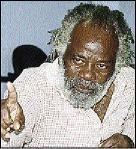Crisis of leadership: Weak governance vs empowered criminals
Published: Sunday | December 20, 2009


Allen
Western Bureau: Montego Bay-based social activist, O. Dave Allen, fears that weak and ineffective leadership by officialdom in western Jamaica could result in the emergence of undesirable leaders.
"We run the risk, given the prevailing situation, that certain sections of our communities could be captured by 'dons'," noted Allen. "Even with the exclusive nature of Montego Bay, where the private sector has failed to bring influence to bear, communities have been left vulnerable to be captured by undesirables."
Allen was speaking against the vast sums of illicit money in the hands of criminals, which have allowed them to procure high-powered guns, buy fast cars and establish pockets of influence in several communities. Since the emergence of the infamous 'lotto scam' in 2003, the face of Montego Bay's criminality has changed. Based on police information, the criminal underworld has significantly been empowered as they are among the primary beneficiary of the estimated US$30 million in illicit money being generated by the scam.
regional void
"Because of the absence of critical leadership from the politicians, private sector and civil society, there is a void in the region's leadership structure. If we don't move quickly to fix the existing leadership structure, those undesirables could move in a take charge," argued Allen, during a Gleaner Editors' Forum on the issue of leadership last week.
Based on several situations that have unfolded in the west in the past five years, few can question that crime, even with an international flavour, has taken a major stranglehold on the region. In addition to the 'lotto scam', which is threatening to destroy the local information technology sector, several prominent citizens from the region have been extradited to the United States for their role in the international drug trade.
However, some communities have been left awash with cash from various illicit schemes; the ill-gotten wealth has also been responsible for many tales of woe. Montego Bay has consistently been recording 100 murders every year since 2003, with an all-time high of 214 to date this year.
With the sphere of criminal enterprise steadily expanding, several community leaders at last Wednesday's Editors' Forum voiced strong concerns about the absence of the kind of decisive leadership, which is required to fully engage the populace on a path towards con-structive growth and development.
"We require a leadership that takes decision for the majority and not just the minority," said Dr Bailey. "We had an excellent development plan for Montego Bay in the form of the Greater Montego Bay Redevelopment Plan, but because some persons felt it was not in their best interest they never supported it, and it is now dead and we are still facing the same problems we wanted to address."
The existing leadership has also earned the criticism of the police. Paul Stanton, head of community safety and security in Area One, told the Editors' Forum that while the police are fully committed and focused in their bid to tackle and neutralise criminals and their various criminal enterprises, he wished the support structure was different, in terms of tangible effort to normalise communities saddled with a myriad of social problems.
"Leadership for political expe-diency has been crippling Jamaica in many ways and has been having a negative impact on various aspect of national life including policing," noted Deputy Superintendent of Police (DSP) Stanton. "This type of leadership must change if we are to go forward."
Despite the clear resolve outlined by DSP Stanton, the leadership of the police also came in for some criticism, as their moral authority to challenge the society to walk the proverbial 'straight and narrow', in light of the increasing numbers of police personnel who have been arrested, charged and convicted in recent times, has been questioned.
moral crisis
"I think we have to admit that, at the present moment, the police force as an institution is facing a serious moral crisis," the Reverend Everton Jackson, pastor of Montego Bay''s Calvary Baptist Church, told the forum. "However, we cannot stop there because a country without a security institution is a country in crisis ... we have to work with the police to ensure that they recapture the moral authority they seem to have lost," he added.
Allen, who heads Community Organisation for Management and Sustainable Development, warns: "Unless conditions are created where the over 40,000 people living on capture lands are regularised and allow to become part of the formal setting, they will continue to be impacted by the influence of the undesirables. That is why we need to take back power from the little clique that is now running the region in their own self interest and replace them with leaders that reflect the wishes of the majority."








